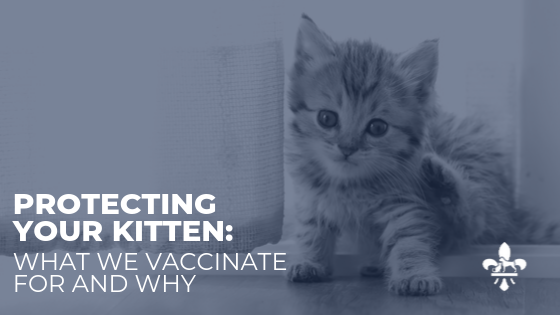|
VACCINATIONS
Many serious diseases can be prevented with vaccinations. With nearly 74 million pet cats in the United States, your pet is likely to come in contact with an infectious disease at some point in their life. Even if your cat is indoors, he or she can be exposed to viruses carried in the air, in dust, or on clothing. In addition, we can never completely rule out the possibility of a door being left open or a cat getting out of your home accidentally. Vaccination is a safe and inexpensive protection against costly, and some cases, deadly diseases. Our veterinarians follow the guidelines set by the American Association of Feline Practitioners, and will work with you to determine which vaccines are needed to protect your pet based on their lifestyle, risk assessment and other health conditions. Here are the diseases our vaccination protocols will protect your cat against: FELINE VIRAL RHINOTRACHEITIS (AKA Feline Herpesvirus-1) Feline herpesvirus is extremely contagious and infectious. It’s typically transmitted by bodily fluids (such as discharge from the nose or eyes) or by aerosolizing (like sneezing). Kittens with an incomplete immune system, or those who came from shelter environments with many cats around are at high risk for this disease. There is no cure for herpesvirus, leaving supportive care as the only option. Similar to herpes virus infections in humans, once a kitten is infected with a herpes virus, the virus will lay dormant throughout their lifetime until a cat is stressed and then clinical signs can flare up. Feline herpesvirus most commonly affects the eyes, the respiratory tract and the gastrointestinal tract. The most common clinical signs seen from feline herpesvirus include sneezing, runny eyes, pink eyelids, lethargy, fever, reluctance to eat, increased respiratory effort and dehydration. DISTEMPER (AKA Panleukopenia) Panleukopenia, also known as feline distemper, is an extremely contagious and deadly disease caused by a virus. The virus is spread through contact with an infected cat’s saliva, urine, blood, nasal discharge, or feces. There is no cure for panleukopenia and, without treatment, it has a high mortality rate. The most important fact to know about panleukopenia is, that it is preventable through vaccination. While cats of all ages can become infected with the distemper virus, kittens—especially those with a poor immune system or those who are unvaccinated—are at the greatest risk for this virus, which causes severe gastrointestinal symptoms. FELINE LEUKEMIA VIRUS Feline leukemia virus (FeLV) causes a highly contagious and potentially fatal retroviral infection that weakens a cat’s immune system, making her susceptible to illness and secondary infection. Feline leukemia is a very common disease. It is often called the “friendly cat” disease as it is commonly spread from cat to cat through casual contact, such as grooming or sharing food or water. Feline leukemia virus and feline immunodeficiency virus (FIV) are among the most common infectious diseases in cats. Cats and kittens with feline leukemia do not always appear sick! In the early stages of the disease, most cats show few signs; the only way to know for sure if they are infected is through a simple blood test. As the disease advances, the following symptoms may occur: weight loss, appetite loss, lethargy, pale gums, bad breath and oral disease, runny eyes and nose, and vomiting. We recommend vaccinating all kittens for feline leukemia so they have an initial foundation of protection. However, we will determine future vaccinations based on your cat’s lifestyle and if they go outdoors after their first year. RABIES Always fatal, rabies is a viral infection that affects your pet’s brain and central nervous system (CNS). Primarily spread through the bite of infected animals such as foxes, raccoons, bats, and skunks, rabies is a zoonotic infection that can affect all mammals, meaning it can be transmitted to humans. For this reason, rabies vaccination is required by law for all dogs and cats.
4 Comments
12/20/2020 10:07:36 am
My dogs love chewing these up and they work wonders on their teeth and breath! They have pristine teeth when we do their vet checkups!
Reply
2/2/2021 12:49:03 pm
It made sense when you said that kittens need to be vaccinated for feline herpesvirus since there's no cure for it. My husband and I want to find a good local vet before adopting a kitten from a shelter next week. Thanks for teaching me what vaccines we'll need to get from the vet to ensure our kitten stays healthy and is protected from common issues!
Reply
Rabies is a disease that is transmitted from animals to humans caused by the rabies virus. The rabies virus is mainly transmitted through an animal’s saliva when the infected animals bite or scratch someone. Can you tell me that, how long does rabies vaccine last? Thanks you reading?
Reply
Your comment will be posted after it is approved.
Leave a Reply. |



 RSS Feed
RSS Feed